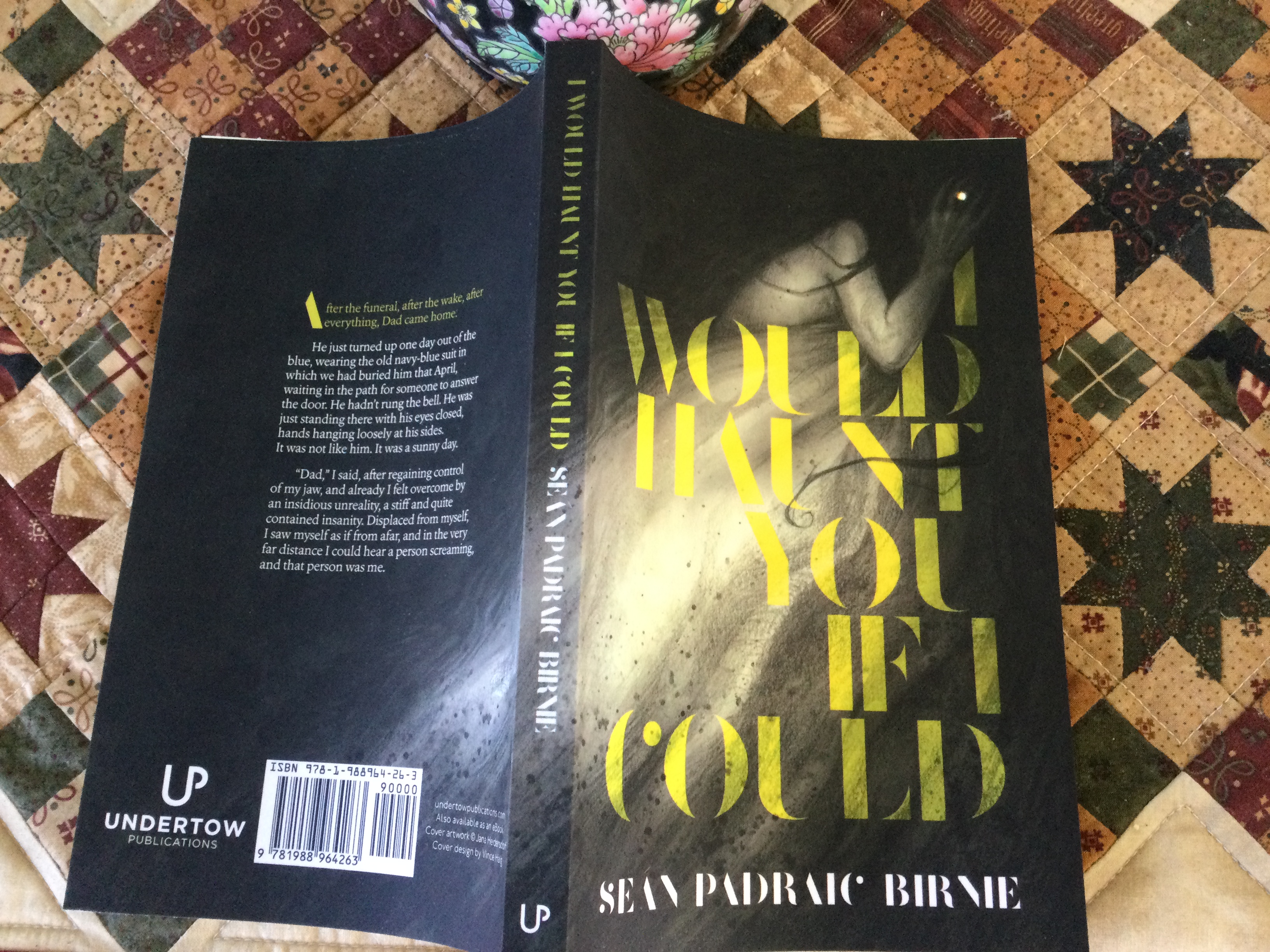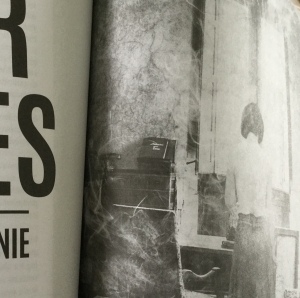I Would Haunt You If I Could – Seán Padraic Birnie
My previous reviews of Seán Padraic Birnie: https://dflewisreviews.wordpress.com/tag/sean-padraic-birnie/ and of Undertow: https://dflewisreviews.wordpress.com/tag/undertow-publications/
When I read this book, my thoughts will appear in the comment stream below…


NEW TO IT ALL
“Her mouth, I realised, was very cold.”
I have realised for a very long while that the work of this author is very special, perhaps from even since before he was published, or perhaps not, but, whatever the case, this new story now fully clinches the deal with me! It is about the narrator’s first three successive girl friends from his age of 24 when he was still a virgin. Only the third one is anything like normal, I guess, while the second even outdoes the first girl friend in a disarming way, and I read this story after posting the title page’s disarming font shown above. And when I did read it, I noticed on page 25 of my copy of this book a carefully honed striation or healed scarring from a previous tear, across the print, as shown above. You may have different scars in your own edition. Even without these chance or deliberate accoutrements, you will NEVER be able to forget this story. Nor will you ever see the word ‘pliable’ again without thinking of this story.
When are retrospect and real-time understanding ever matched? Is everything in life always too late to be mended?
Cross-referenced with ‘Streuobstwiese’ here: https://dflewisreviews.wordpress.com/2021/03/27/to-drown-in-dark-water-steve-toase/#comment-21218
My review of the next story is from the context here: https://dflewisreviews.wordpress.com/2018/07/19/black-static-64/#comment-13251
Time has told!
==========================================================
OUT OF THE BLUE
“The notion of hauling the deadweight of his body up into the attic filled me with horror.”
Each chunk divided by smaller chunks, all to be taken step by step, until, by dint of Zeno’s Paradox, we reach its ‘cusp’. This is haunting, disarmingly hypnotic, deadpan material that, despite its hindsight absurdism, one wholly believes in, as one reads it chunk by chunk. The return of the narrator’s dead father after the funeral, as a rather amenable deadweight to push around, silent and unsmelly, anechoic, as Cage would put it, but the cage here is eventually beyond the hatch of the attic, kept out of the way of visitors. And there is also the narrator’s wife (on the cusp pregnant with a future character in this story) and she once kept her own mother in a hutch, not a hatch, or have I misremembered something? This is attritional stuff, and it also deals with the sanitisation of death and other related social concerns. “In time we can grow accustomed to the most extraordinary things.” The easiest lies being those people want to believe. And the story’s ending is a shocker, despite still being deadpan and methodical. Also resonates with “The Man Who Wore His Father’s Clothes” by Andrew Apter, combined with the loft in M. John Harrison’s “Cicisbeo”, and much else, as this story’s time’s worth of years passes by. Arguably, this Birnie work (not ‘something to burn’!) is a ghostly classic and a semi-comic masterpiece. Time will tell.
My review of the next story is from the context here: https://dflewisreviews.wordpress.com/2020/03/17/black-static-74-interzone-286/#comment-18574
=========================================================
THE TURN
“— she did not think she had ever heard such silence before: […]; only her breathing, which in the dark might have come from someone else’s lips, breaths drawn from a stranger’s lungs.”
The desolately haunting story of Marie as her car dies on an unlit country road near Lewes, with thoughts of what she now considers to have been a crazy mission to see someone to whom she sounds very attached called Anna (the Anna from Honeybones?)… as this unfolds powerfully, with her fears of another car on this lonely road crashing into her stationary one, and she meets not Anna but another woman with the petrol she needs… but is it? Did she have a petroleum car and this was diesel, as it says at one point, I wondered? Even though it seemed to power the car onward for a nonce, I wondered if I was learning about deeper and prophetic meanings towards a gestalt here of our still open-ended predicament in real-time today…
“…the world was a system of black boxes nested within black boxes like Matryoshka dolls and how powerless she was when things broke down.”
LIKE A ZIP
“…Alice knew, but beneath the knowledge of this, of what she knew that one should do, Alice was already dimly aware of what she knew that she would do.”
A literal tagging and tugging retrospect and immediacy theme more than just disarmingly teased open, a theme reteethed with how this book started and is now taken to new wincingly tactile levels of the first story’s bodily excoriating and scoring to whatever holy or holistic hollowness lies within. Alice unzipping her wonderland of retrospective certainty…
Cross-referenced again with the simultaneous Undertow book here (Kromlau Gambit): https://dflewisreviews.wordpress.com/2021/03/27/to-drown-in-dark-water-steve-toase/#comment-21226
HAND-ME-DOWN
“…causing thought to lag.
Buffering, she thought, and heard a hollow laugh,…”
Other than this story’s, for me, predictable ending, it is a fine work that furthers this book’s earlier ‘retrospect and immediacy’ theme, here with a sense of delayed word-consciousness as part of modern mobile communication and just of general life itself, as laced with evasion — a sense of Aickman-like shapeless thoughts or real shapeless shapes, people thin and grey, or substances threadbare or gauzy, inducing serial paranoia in a lonely single mother watching her new born daughter — through a remote one-way-communication monitor — sleeping in a cot elsewhere in the house. Having just written the word ‘remote’, it felt as if something induced me to use that word, although I am no longer sure whether it was used as a word in this story’s text itself. A text that belatedly hands me down words to use. It would haunt me if it could.
Cross-referenced today here: https://nullimmortalis.wordpress.com/24625-2/#comment-15408
HOLES
“His chest in the night has become crisscrossed with red lines as if some furious editor had scrawled out a torso of unworthy sentences.”
I, too, had impetigo as a child that became a mask for my face, the only serious illness I remember suffering in those days … And I once wrote a story with the biggest hole of all: no words. Both of these statements are true. The blank story in fact was published. This new story, today, often with empty spaces that the paragraphing entails, is from the point of view of a man with a latent lingering cold and his girl friend who becomes more and more remote because of seeing the accretive onset of his bodily rashes, and she ends up attempting to communicate only by texts. They both coughed. The whole and the hole in holy holism.
“It was easier to describe by the things it was not than by the things that it was.”
I WOULD HAUNT YOU IF I COULD
“(I live my life, I think, in the shadow of things I sense but do not understand.)”
A novelette hypnotically accreting its own “mantras” or leitmotifs, about its narrator Genni’s mantras, her refrain of Genni, Gary, or Gerry, her own mother, her dead dad, her landlord, her departed ex, in the Brighton area’s “coastal light”. She may even be the woman with psychic powers she believes herself to be or even, for me, that GPS-less wandering vintage-car Genevieve, where past, present and future (as recently in my review here) are contained within their own palimpsest. Paint schemes galore on various walls, including the insidious yellow coming through the overpainted white like the invasive literary ‘yellow wallpaper’ from elsewhere as the colour of suicide or murder or increasing feminine remoteness and torpidity? These mantras in the text are incantations, they are “lazy angels”, dust-motes in that coastal light or pebbles from the beach massed by a storm at the door of her bedsit land where she observes her seaside co-tenants as if she is a Pinter if not a painter. Connections as causation or correlation, as Jungian synchronicity of astrology or crass cause-and-effect, ensure that such manifold mantras manage to haunt me and are likely to haunt me forever. Damp growth ever-growing on the wall, too, as a pareidoliac face in synergy with a refrain of the word ‘positivity’ to urge me through life: a no-mean-feat mutuality of synergy by otherwise opposing causations and correlations, as further correlated by the therapy of that therapist ‘motherfucker’ (a word not strictly used in this novelette) working alongside the therapy of her latest Proustian self. “Stray dots connect. Three dots dance.” Plaster like this book’s earlier crazed skin, here as melded dust-motes from the hoover vacuum eventually becoming a healing force, ironically neutralising any ominous thoughts one may have, not necessarily about that ‘vacuum’, but about Genni’s sense of the void itself.
“About that cup of tea?
The water is fine, I say, and try to smile.”
Above zip story cross-referenced here: https://dflewisreviews.wordpress.com/2021/03/27/to-drown-in-dark-water-steve-toase/#comment-21247
COMPANY
“You are listening intensely, the phone pressed to your ear.”
In isolation, this story is a short tantalising hybrid of parts blending absence with presence while washing-up with an insistent earworm in the shape of a once forgotten pop song.
Meanwhile, I am a great believer in the preternatural serendipity of literature — and having read this story straight after this story, both stories, as their own tantalising hybrid in company together, each take on a new meaning. Is this man’s wife the other story’s old man’s daughter, the old man who created the actual phone from his own body????? The connection, even if inadvertent (which it is), incredibly seems to be too strong to discount or disconnect!
I TOLD YOU NOT TO GO
“Then she lifted the phone to her ear… […] And she knew its was him, could hear his breathing…”
A wonderful short tale of an old petulant married couple, and her husband’s defiance of her with his ending up, after his death, infiltrating the electrical then other parts of the house… both hilarious and poignant, alongside the balefully hopeful tontine of popular TV game shows, and I hope you don’t mind me keeping this work’s company with the inadvertent resonance of two of my short works as hybrid in ‘The Big-Headed People’ booklet, the two works at the end.
I’ll now tell my own wife that I would haunt her if I could!
My review of the next story is from the context here: https://dflewisreviews.wordpress.com/2021/02/06/oculus-sinister/#comment-20922
=========================================
LUCIDA
“…but all photographs are a kind of fiction.”
This author is possibly one of the most generally underrated of my favourite authors. And this is his relatively short work’s richly believable description of the narrator’s clunky but sensitively off-key camera that might break your toe if you drop it from the missing tripod. Where negative meets positive in the merest blink, creating a Polaroid dream of a palindromic selfie. Perfect texture and substance as meaningful prose, as well as pointless in a constructively throwaway manner. No mean feat of developing.
Underrated till now when this book has since been published.
SISTER
“: to move one thing damaged it in its entirety, as if each object were the keystone.”
…as in literature, as well as in a genius loci or a person, each uniquely made from discrete uniquenesses. The gestalt that is eventually created. Here, as a standalone story, we have a young brother’s regathering of his dead young sister from makeshiift ingredients such as “flax fiber” and “broomsticks” and objects personal to her when alive, a sort of scarecrow, hopefully to please the mother and father when he shows it to them, especially the mother who had preserved her daughter’s bedroom in accordance with the quote above. A wonderful standalone and unique work of a reawakening, particularly by dint of a single last item appended to the ‘model’ that becomes her again. A story of mother-daughter, as well as brother-sister.
I know such things are inadvertent or serendipitous or preternatural or coincidental or Fortean or whatever (the jury is still out), but this literary work also provides another truly miraculous supplement of mutual synergy with today’s story in the companion review here. Perhaps the most miraculous cross-synchronicity in any of my reviews. Especially, there was a keystone in the other story, one I had somehow forgotten to mention in my review just now of it (before reading this Birnie story): a piece of paper handwritten with the words ‘help me’!
Perhaps add ‘confirmation-bias’ to the list of options of synchronicity above.
YOU KNOW WHAT TO DO
“With her eyes closed she heard him enter the room. A soft tread — he’d always had a soft tread.”
Me, too, I guess. Another story teeming with leitmotifs like that of the ‘soft tread’ couple, wife and husband, in the I-told-you-not-to-go echo of someone else’s would-be hauntings-of-each-other-if-only-they-could. Leitmotifs from this book, as well as from within the story itself, from themselves, their “thereness” in the new Brighton-area home built with ‘resin’ if not ‘bungaroosh’, their ‘Tsundoku’ of books, someone else’s ‘shit in the attic’, whose voicemail calling whom, who’s missing whose missing half of a relationship, someone else’s palimpsest of photographs as in earlier-linked Deirdre Madden’s TSEliotry if not toiletry, photographs also like “curated postures of Instagrammable display”, “someone else’s dreams”, “sound mirrors”, “vacuum cleaners like mannequins”, someone else’s “underunderstairs” connected to the unexpected basement sold to them them by a Jo or a Joyce in charge of an ancient, pre-modern communicative WiFi hub under the pavement disguised as a stopcock, and, first or finally, someone else’s haunted room mistaken as an old air-raid shelter (with an old wooden desk and aura of violin music) that they did not know they had bought when buying this new home…
“Open one more box and three more fell out.”
My review of the next story is from the context here: https://dflewisreviews.wordpress.com/2020/02/09/shadows-tall-trees-8/
==================================================
 DOLLFACE by Seán Padraic Birnie
DOLLFACE by Seán Padraic Birnie
“It wasn’t hard to imagine some fucker with a Jesus complex trying to walk on it, the sea was so flat.”
Some scenes on Brighton front near the torus and the husk of a pier, whether alternate world one day and real in our real terms the next? Actually, that’s where we end up after a more claustrophobic story of two old friends who meet by coincidence as next door neighbours not via intentional Facebook searches in the previous story, yet there is still a suspected ‘ulterior motive’ involved in some way, a strategy or device to match the earlier one, i.e. a sister in law’s act of giving the daughter of one of them a doll. Apt it was from Mothercare as Mothercare does not exist. A ‘smart’ doll, with a birthmark, but I imagine it also as one of those old-fashioned sinister dolls. Almost another Huldra that no amount of burning or drowning disposal works. Do these two men — male-bonding while drinking lager regularly in the back garden on broken deck chairs amid their separate or shared memories — actually bond in more ways than one? A truly tantalising story that is fitting for a writer whose work I have greatly admired in the past.
Almost another Huldra that no amount of burning or drowning disposal works. Do these two men — male-bonding while drinking lager regularly in the back garden on broken deck chairs amid their separate or shared memories — actually bond in more ways than one? A truly tantalising story that is fitting for a writer whose work I have greatly admired in the past.
My review of the next story is from the context here: https://dflewisreviews.wordpress.com/2019/09/16/black-static-71-interzone-283/
===================================================
 OTHER HOUSES by Seán Padraic Birnie
OTHER HOUSES by Seán Padraic Birnie
“, as if I could see the mechanisms at play within the black boxes of her eyes.”
“…muffled voices heard as if through the walls of terraced houses.”
It seems sacrilegious to even think that I might be able to do justice to such a major reading experience with an attempted summary, let alone the creation, as is my usual wont, of connections with the rest of this set of fictions. So be it, for the very first time since I started book reviewing, I won’t do any of this. A novelette that will haunt you forever and one that will be anthologised many times into many futures. It now has a unique place in my heart as a work of literature.
“The calculation of infinite probabilities […] a rainforest of events, of lives and lifelines and unexpected destinies.”
=====================================================
I would have told you so already if I could.
end